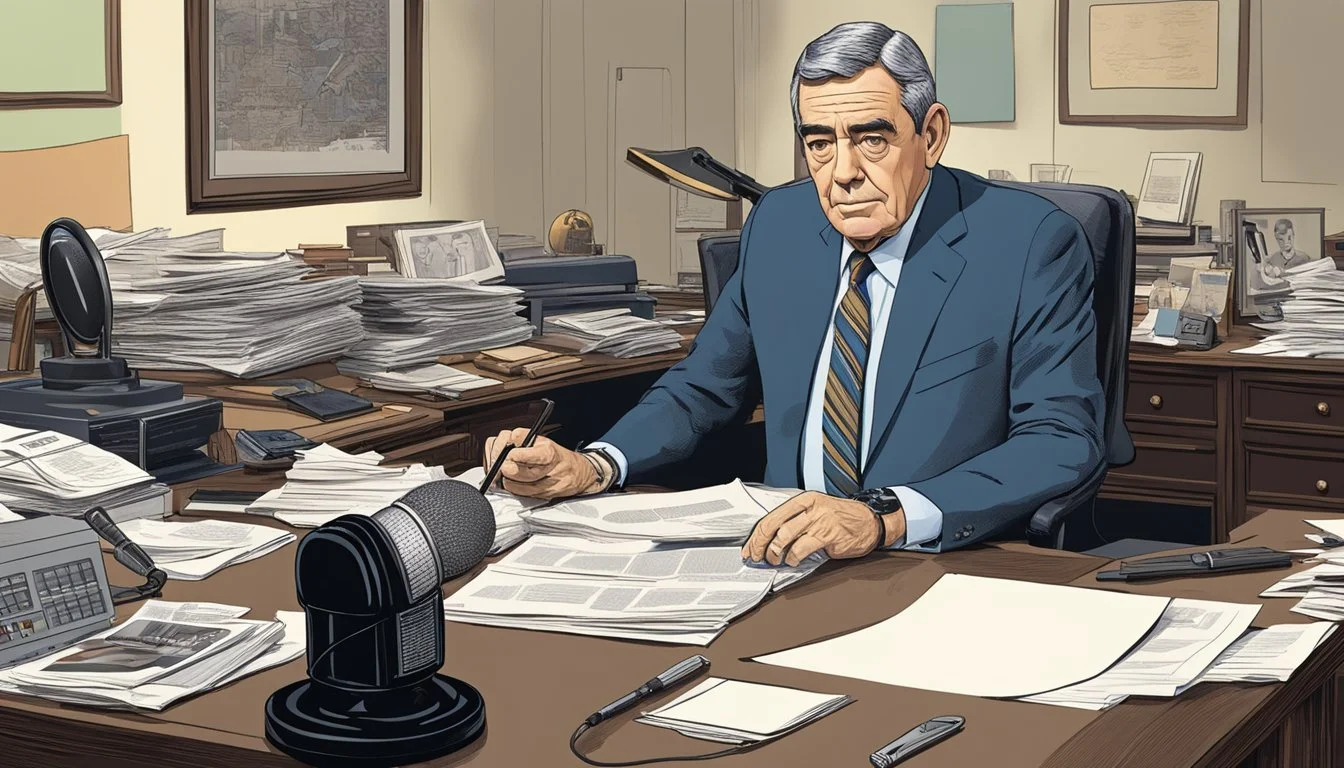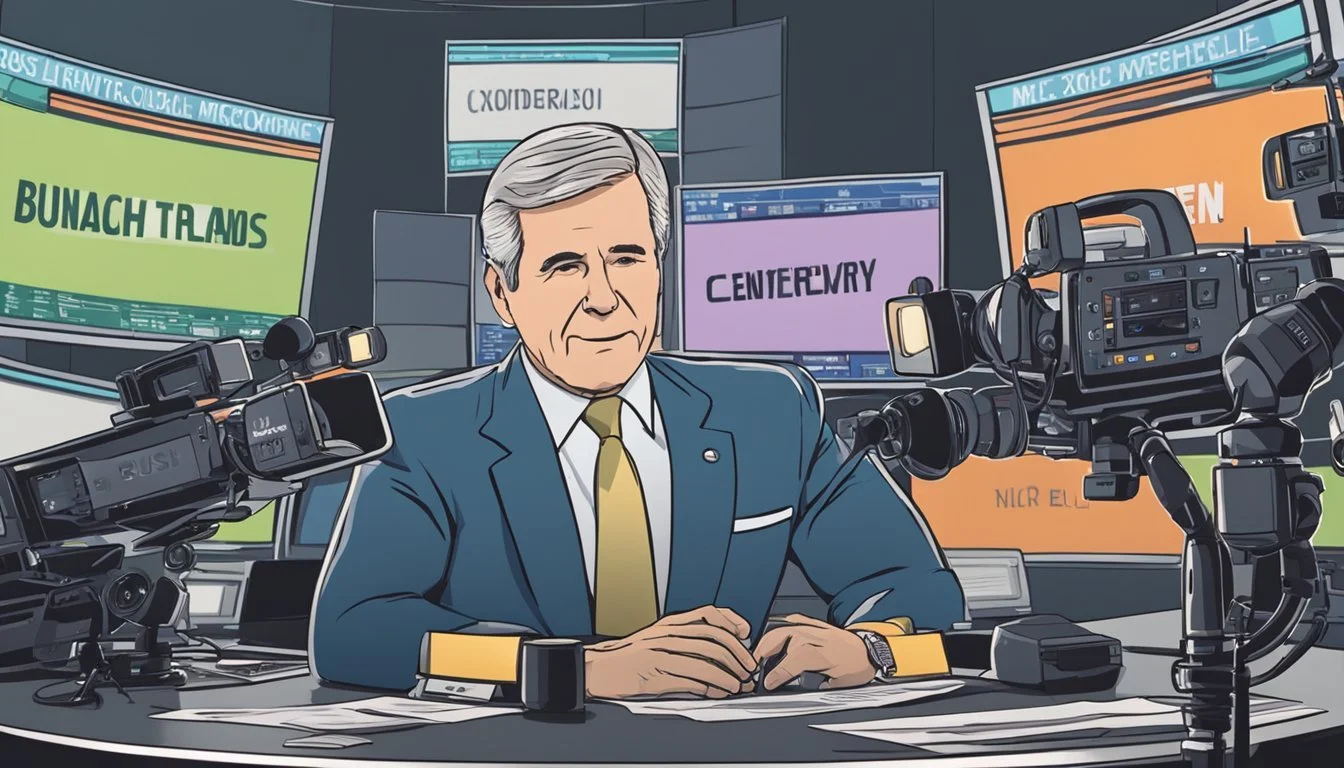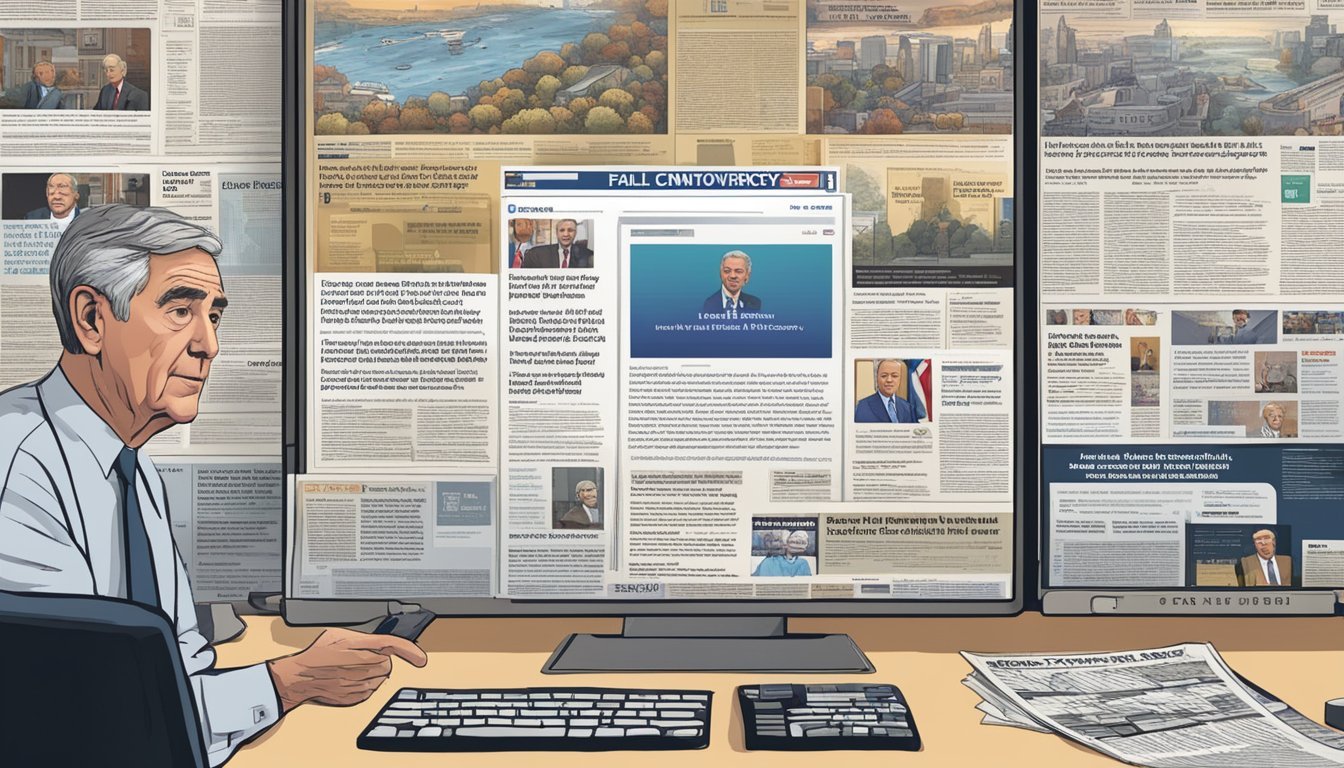Dan Rather's Fall: The Bush Controversy That Ended a Career
Examining the 2004 Document Scandal
Dan Rather's illustrious career as a CBS News anchor came to an abrupt end in 2004 due to a controversial report about President George W. Bush's service in the Texas Air National Guard. The story, which relied on documents of questionable authenticity, sparked a firestorm of criticism and ultimately led to Rather's departure from the network he had called home for decades.
The scandal centered on allegations that Bush had received preferential treatment during his time in the National Guard, potentially avoiding deployment to Vietnam. While the core claims of the report may have had merit, the reliance on unverified documents undermined the credibility of both Rather and CBS News. The incident highlighted the pressures of meeting deadlines in the fast-paced world of broadcast journalism and the importance of thorough fact-checking.
The fallout from this controversy reshaped the landscape of television news and raised questions about journalistic integrity in the digital age. Even years later, Rather maintained his belief in the accuracy of the story's central claims, despite the issues with the supporting evidence. This episode serves as a cautionary tale for journalists and media organizations, emphasizing the critical balance between breaking news and maintaining rigorous standards of verification.
Dan Rather's Career and Legacy
Dan Rather's journalistic career spanned over six decades, leaving an indelible mark on American broadcast news. His tenure at CBS News included groundbreaking reporting and high-profile interviews that shaped public discourse.
Rise to Prominence
Dan Rather joined CBS News in 1962, quickly establishing himself as a talented reporter. His coverage of Hurricane Carla in Texas caught the network's attention, leading to more prominent assignments. Rather's reporting on the Kennedy assassination in 1963 further elevated his profile.
In 1981, Rather succeeded Walter Cronkite as anchor of the CBS Evening News. This role cemented his position as one of the most influential journalists in America. He held this position for 24 years, becoming a trusted voice for millions of viewers.
Rather's career also included significant contributions to 60 Minutes, CBS's flagship investigative news program. His work on the show demonstrated his versatility as both an anchor and field reporter.
Contribution to Broadcast Journalism
Rather's impact on broadcast journalism was substantial. He pioneered the use of satellite technology for live reporting, enhancing the immediacy of news coverage. His style blended hard-hitting journalism with a folksy demeanor, making complex stories accessible to viewers.
Rather's commitment to journalistic integrity set standards for the industry. He emphasized fact-checking and source verification, reinforcing the importance of accurate reporting. His coverage of major events, from Watergate to the Gulf War, helped shape public understanding of critical issues.
Throughout his career, Rather championed investigative journalism. He pursued stories that exposed corruption and challenged those in power, regardless of potential consequences.
Notable Interviews and Coverage
Rather conducted numerous high-profile interviews during his career. His confrontational 1988 interview with then-Vice President George H.W. Bush regarding the Iran-Contra affair became infamous for its intensity.
His coverage of the Vietnam War in the 1960s brought the realities of conflict into American living rooms. Rather's reporting from Afghanistan in the 1980s shed light on the Soviet invasion and its impact on the region.
In 2004, Rather reported on President George W. Bush's military service record. This controversial story, which relied on disputed documents, led to intense scrutiny and ultimately contributed to Rather's departure from CBS in 2005.
The 2004 Bush National Guard Story
Dan Rather's report on President George W. Bush's military service ignited a firestorm of controversy. The story centered on documents that questioned Bush's fulfillment of his National Guard duties in the early 1970s.
Unveiling the Controversial Documents
CBS News obtained memos allegedly written by Lieutenant Colonel Jerry Killian in 1972 and 1973. These documents suggested Bush had failed to meet his National Guard service requirements. The memos claimed Bush disobeyed a direct order to take a physical exam and received preferential treatment.
CBS producer Mary Mapes and freelance journalist Michael Smith acquired the documents from Bill Burkett, a former National Guard officer. The memos appeared to corroborate long-standing rumors about Bush's military service.
The '60 Minutes II' Segment
On September 8, 2004, Dan Rather presented the story on "60 Minutes II." The segment aired during the heated presidential campaign between Bush and John Kerry. Rather interviewed Ben Barnes, a former Texas official who claimed he helped Bush enter the National Guard.
The report sparked immediate backlash from Bush supporters and conservative media outlets. Critics questioned the timing of the story and its potential impact on the upcoming election.
Claims of Forged Documents
Shortly after the broadcast, doubts emerged about the authenticity of the Killian memos. Typography experts noted inconsistencies between the documents and typewriter capabilities of the early 1970s. The memos used proportional spacing and superscript characters, features uncommon in typewriters of that era.
CBS initially defended the story's accuracy. However, as scrutiny intensified, the network launched an internal investigation. On September 20, CBS admitted it could not verify the documents' authenticity and apologized for airing the segment.
The controversy, dubbed "Rathergate," led to Rather's departure from CBS News in 2005. It tarnished his long and distinguished career in journalism.
Subsequent Investigation and Fallout
CBS launched an internal review following the controversial report on President Bush's military service. Public scrutiny and media criticism intensified as questions arose about the authenticity of the documents. Expert analysis played a crucial role in determining the validity of the evidence presented.
CBS Internal Review
CBS appointed former U.S. Attorney General Richard Thornburgh and former Associated Press President Louis Boccardi to lead an independent investigation. The panel conducted interviews with key personnel involved in the story. They examined the editorial process and decision-making that led to the broadcast.
The review uncovered several lapses in judgment and failures to follow standard journalistic practices. It found that CBS News failed to properly authenticate the documents before airing the segment. The investigators also noted a rush to broadcast the story without adequate vetting.
Public and Media Critique
The controversy sparked intense debate in the media and among the public. Critics accused CBS of political bias and sloppy journalism. Supporters of President Bush questioned the network's motives in running the story so close to the 2004 election.
Many news organizations conducted their own analyses of the documents. Some pointed out inconsistencies in the typeface and formatting that suggested the memos were not from the 1970s. The story quickly shifted from Bush's military service to CBS's journalistic practices.
Social media and blogs played a significant role in spreading doubts about the documents' authenticity. This marked an early example of online fact-checking challenging traditional media narratives.
Expert Analysis on Documents
Document examiners and typography experts weighed in on the controversy. Many concluded that the memos were likely created using modern word processing software, not a 1970s-era typewriter. Key points of contention included:
Proportional spacing of characters
Superscript "th" in dates
Curved apostrophes and quotation marks
Some experts argued that typewriters capable of producing such features existed in the 1970s, but were rare and unlikely to be used for routine military memos. Others noted inconsistencies in formatting and terminology compared to authentic military documents from the period.
The conflicting expert opinions added to the complexity of the case and fueled ongoing debate about the documents' origins.
Impact on Dan Rather's Career
Dan Rather's involvement in the Bush National Guard controversy had severe consequences for his long-standing career in journalism. The fallout led to significant professional and legal repercussions.
Stepping Down from 'CBS Evening News'
Dan Rather's 24-year tenure as anchor of 'CBS Evening News' came to an abrupt end in 2005. The controversy surrounding the Bush National Guard story eroded trust in Rather's reporting. CBS asked him to step down from his anchor position earlier than planned.
Rather's departure marked a dramatic shift in his career trajectory. He had been a fixture in American living rooms for decades, covering major events like the Kennedy assassination and Watergate. The scandal tarnished his reputation as a respected journalist.
Legal Proceedings and Lawsuit
Following his departure from CBS, Rather took legal action against his former employer. He filed a $70 million lawsuit against CBS and its parent company, Viacom, in 2007. Rather claimed the network had made him a "scapegoat" in the scandal.
The lawsuit dragged on for several years, keeping the controversy in the public eye. It was ultimately dismissed by the New York State Appeals Court in 2009. This legal battle further strained Rather's relationship with CBS and the broader journalism community.
Despite the setbacks, Rather continued working in journalism through other outlets. He launched Dan Rather Reports on HDNet (now AXS TV) and maintained an active social media presence. However, his career never fully recovered from the scandal's impact.
The Broader Context of the Controversy
Dan Rather's downfall occurred amidst a complex political landscape and evolving media environment. The scandal raised questions about journalistic integrity, political influence, and the media's role in shaping public opinion during a contentious era.
Political Climate and Vietnam War
The Bush controversy unfolded against the backdrop of the Vietnam War's lasting impact on American politics. Military service records became a contentious issue in presidential campaigns. John Kerry's 2004 candidacy faced scrutiny over his Vietnam service, while George W. Bush's National Guard duty came under question.
The debate tapped into deeper divisions about the war and its legacy. Some viewed military service as a measure of leadership, while others questioned the fairness of focusing on decades-old records.
Public opinion on the Vietnam War remained split, influencing how voters perceived candidates' military backgrounds. This political climate heightened the stakes of Rather's reporting on Bush's service record.
Media's Role in Political Discourse
The Rather scandal highlighted the media's power to shape political narratives. 24-hour news cycles and increasing competition put pressure on journalists to break stories quickly. This urgency sometimes conflicted with thorough fact-checking processes.
The incident sparked debate about media bias and objectivity. Critics accused CBS of political motivation, while supporters defended investigative journalism's importance. The controversy coincided with the rise of online news sources and blogs, challenging traditional media's dominance.
Social media was in its infancy, but the scandal foreshadowed how quickly information - and misinformation - could spread online. The episode underscored the need for rigorous verification in an era of rapid news dissemination.
Cultural Depictions and Aftermath
The Dan Rather controversy sparked significant interest in media and popular culture. It inspired both dramatic and documentary portrayals, while Rather himself pursued new journalistic endeavors after leaving CBS.
Representation in Film and Literature
The 2015 film "Truth" brought the Rather scandal to the big screen. Robert Redford portrayed Dan Rather, while Cate Blanchett took on the role of producer Mary Mapes. The movie, based on Mapes' memoir, offered a sympathetic view of the CBS team's investigation into George W. Bush's military service.
Critics praised the performances but debated the film's accuracy. Some felt it downplayed journalistic missteps. The Hollywood Reporter noted the movie reignited discussions about media ethics and political influence on reporting.
Several books also explored the controversy, presenting varied perspectives on the events and their implications for modern journalism.
Dan Rather's Pursuits Post-CBS
After departing CBS, Rather refused to fade from public view. He launched "Dan Rather Reports" on HDNet in 2006, continuing his investigative journalism work. The program ran for six years, tackling topics from foreign policy to domestic issues.
Rather later hosted "The Big Interview" on AXS TV, conducting in-depth conversations with notable figures. He embraced social media, building a significant following on platforms like Facebook.
Rather's post-CBS career included frequent media appearances and commentary on current events. He remained a vocal critic of media consolidation and what he perceived as declining journalistic standards.
The Role of Social Media in News Consumption
Social media platforms have revolutionized how people access and engage with news content. These digital spaces now serve as primary sources of information for many, reshaping traditional media landscapes.
Shifts in Audience Engagement
Twitter and Facebook have become go-to platforms for news consumption. Users can follow journalists, news outlets, and public figures directly, receiving real-time updates on breaking stories. This immediate access has changed expectations for news delivery speed.
Social media algorithms curate personalized news feeds, presenting content based on users' interests and interactions. This tailoring can create echo chambers, potentially limiting exposure to diverse viewpoints.
News organizations have adapted their strategies to reach audiences on these platforms. They now create content specifically formatted for social media consumption, such as short video clips and infographics.
Influence on Public Opinion
Social media's impact on shaping public opinion is significant. Trending topics and viral posts can quickly elevate certain stories, sometimes overshadowing other important news events.
The rapid spread of information on these platforms can lead to both increased awareness and the proliferation of misinformation. Fact-checking efforts have become crucial in combating false narratives.
Public figures, including politicians like Donald Trump, have leveraged social media to communicate directly with their followers. This direct line of communication can bypass traditional media filters.
User-generated content and citizen journalism have gained prominence, allowing individuals to share firsthand accounts of events. This has both enriched and complicated the news landscape.



